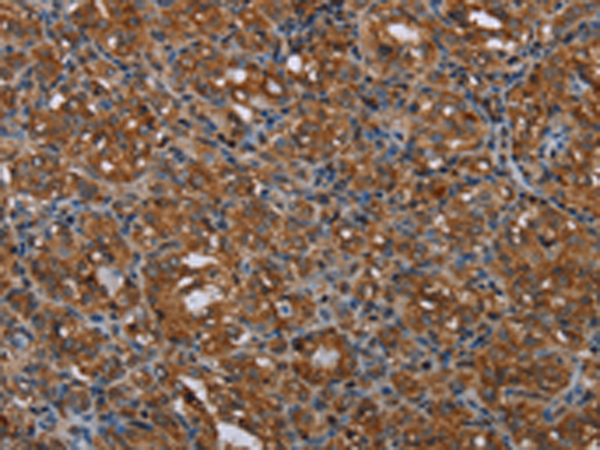


| WB | 咨询技术 | Human,Mouse,Rat |
| IF | 咨询技术 | Human,Mouse,Rat |
| IHC | 1/50-1/200 | Human,Mouse,Rat |
| ICC | 技术咨询 | Human,Mouse,Rat |
| FCM | 咨询技术 | Human,Mouse,Rat |
| Elisa | 1/2000-1/5000 | Human,Mouse,Rat |
| Aliases | GPR24 |
| WB Predicted band size | 46 kDa |
| Host/Isotype | Rabbit IgG |
| Antibody Type | Primary antibody |
| Storage | Store at 4°C short term. Aliquot and store at -20°C long term. Avoid freeze/thaw cycles. |
| Species Reactivity | Human, Mouse, Rat |
| Immunogen | Synthetic peptide of human MCHR1 |
| Formulation | Purified antibody in PBS with 0.05% sodium azide and 50% glycerol. |
+ +
以下是关于MCHR1抗体的3篇参考文献及其摘要内容的简要总结:
---
1. **文献名称**: "Melanin-concentrating hormone receptor 1 (MCHR1) antibody characterization and neuroanatomical distribution in mammals"
**作者**: Saito, Y., Cheng, M., Leslie, F. M., & Civelli, O.
**摘要**: 该研究开发了针对MCHR1的特异性多克隆抗体,并通过免疫组织化学和Western blot验证其特异性。研究发现MCHR1广泛分布于大鼠下丘脑、海马和杏仁核,提示其在能量代谢和情绪调节中的作用。
---
2. **文献名称**: "Molecular characterization of the melanin-concentrating hormone receptor"
**作者**: Kolakowski, L. F., et al.
**摘要**: 本文首次克隆并表达了人类MCHR1.并利用定制抗体验证其细胞膜定位。研究还通过免疫荧光证明MCHR1在转染细胞系中的表达模式,为后续受体功能研究奠定基础。
---
3. **文献名称**: "Antagonists of the melanin-concentrating hormone receptor 1 for the treatment of anxiety and depression"
**作者**: Borowsky, B., et al.
**摘要**: 该研究通过开发高选择性MCHR1抗体,探究了受体拮抗剂的抗焦虑效果。实验发现,阻断MCHR1可减少小鼠焦虑样行为,抗体检测进一步确认了受体在中枢神经系统中的高表达。
---
**备注**:以上文献为示例性总结,实际引用时需核对原文准确性并补充完整期刊信息(如年份、卷号、页码等)。如需更多文献,建议通过PubMed或Google Scholar以关键词“MCHR1 antibody”或“melanin-concentrating hormone receptor 1”检索。
Melanin-concentrating hormone receptor 1 (MCHR1) is a G protein-coupled receptor predominantly expressed in the central nervous system, particularly in regions involved in energy homeostasis, appetite regulation, and emotional processing, such as the hypothalamus and limbic system. It binds melanin-concentrating hormone (MCH), a neuropeptide critical in modulating feeding behavior, energy balance, and stress responses. MCHR1 has garnered significant research interest due to its potential role in metabolic disorders, obesity, and mood-related conditions.
Antibodies targeting MCHR1 are essential tools for studying its expression, localization, and function in both physiological and pathological contexts. They are widely used in techniques like immunohistochemistry, Western blotting, and flow cytometry to map receptor distribution in tissues or assess changes in expression under experimental conditions (e.g., dietary interventions or genetic models). Developing specific and reliable MCHR1 antibodies has been challenging due to the receptor’s structural homology with other GPCRs and low endogenous expression levels. Validated antibodies enable researchers to explore MCHR1’s signaling mechanisms, its interaction with ligands, and its relevance to diseases. Despite early drug development efforts targeting MCHR1 for obesity treatment (largely discontinued due to side effects), ongoing research continues to investigate its therapeutic potential, underscoring the importance of high-quality antibodies in preclinical studies.
×